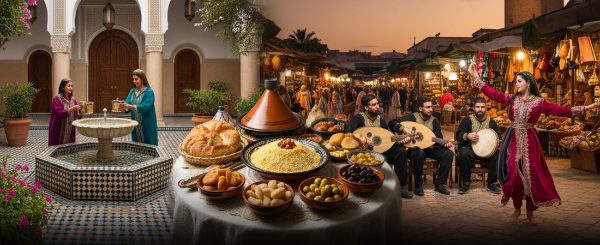Moroccan Culture: Traditions, Heritage, Food, Music & Lifestyle

Moroccan culture is a vibrant blend of Arab, Amazigh (Berber), African, and Andalusian influences, shaped by centuries of history, trade, and migration. From the bustling souks of Marrakech to the tranquil Amazigh villages in the Atlas Mountains, Morocco offers a unique cultural identity that reflects both tradition and modernity.
Whether you’re exploring Moroccan cuisine, music, art, or daily life, understanding the country’s culture is key to truly experiencing Morocco.
Moroccan culture is known for its blend of Amazigh (Berber), Arab, African, and Andalusian influences, reflected in its traditions, food, music, and architecture.
2. What are some traditional Moroccan customs?
Common customs include hospitality with mint tea, family gatherings, religious festivals, and traditional clothing like djellabas and kaftans.
3. What food is Morocco famous for?
Morocco is famous for couscous, tagine, pastilla, harira soup, and sweet mint tea, all showcasing rich spices and culinary diversity.
4. What languages are spoken in Morocco?
Morocco’s official languages are Arabic and Tamazight (Berber), but French, Spanish, and English are also widely spoken.
5. Is Moroccan culture family-oriented?
Yes. Family plays a central role in Moroccan society, with strong values of respect, community, and hospitality.
Whether you’re exploring Moroccan cuisine, music, art, or daily life, understanding the country’s culture is key to truly experiencing Morocco.
The Roots of Moroccan Culture
Amazigh Heritage
The indigenous Amazigh (Berber) people are the foundation of Moroccan identity. Their language, traditions, and crafts continue to thrive across rural areas, from the High Atlas Mountains to the Sahara.
Arab and Islamic Influence
Arab culture arrived with Islam in the 7th century, shaping Morocco’s religion, architecture, and daily customs. Islamic traditions are visible in the call to prayer, ornate mosques, and family-centered way of life.Andalusian Legacy
Following the expulsion from Spain in the 15th century, Muslims and Jews brought Andalusian art, music, and architecture to Morocco. Cities like Fes, Tétouan, and Chefchaouen still showcase this legacy.French and Spanish Influence
During the 20th century, Morocco was partly colonized by France and Spain. Their impact is still present in language, education, and architecture, particularly in northern and coastal cities.Moroccan Traditions and Customs
- Hospitality: Moroccans are renowned for their warm welcome, often offering mint tea to guests.
- Family Life: Strong family bonds and respect for elders play a central role in society.
- Religion: Islam is deeply woven into daily life, guiding values, festivals, and social practices.
- Festivals: Events like Eid al-Fitr, Eid al-Adha, and the Mawazine Music Festival reflect both traditional and modern culture.
Moroccan Cuisine: A Culinary Journey
Food is at the heart of Moroccan culture. Known for its flavors, spices, and diversity, Moroccan cuisine is celebrated worldwide.- Couscous: the national dish, traditionally served on Fridays.
- Tagine: a slow-cooked stew with meat, vegetables, and spices.
- Pastilla: a savory-sweet pie filled with chicken or fish.
- Mint Tea: often called “Moroccan whiskey,” symbolizing hospitality.
Art, Music, and Craftsmanship
Music
- Gnawa: spiritual music with African roots.
- Andalusian Classical Music: brought from Spain, rich in poetry and tradition.
- Chaabi: popular folk music heard at weddings and celebrations.
Craftsmanship
Morocco is famous for handmade carpets, pottery, leather goods, and intricate woodwork. Souks across Fes, Marrakech, and Tétouan are treasure troves of artisanal heritage.Architecture
From the majestic mosques of Casablanca to the blue-washed streets of Chefchaouen, Moroccan architecture blends Islamic artistry with Berber and Andalusian elements.Languages in Morocco
Morocco is a multilingual nation:- Arabic (Darija – Moroccan dialect) is the most widely spoken.
- Tamazight (Berber language) is also an official language.
- French is used in business, education, and government.
- Spanish is common in northern Morocco.
- English is increasingly spoken among the younger generation.
Moroccan Clothing
Traditional clothing continues to be worn during festivals and daily life:- Djellaba: a long robe with a hood, worn by both men and women.
- Kaftan: elegant dresses often worn at weddings.
- Babouches: colorful leather slippers, a Moroccan staple.
Modern Moroccan Culture
While deeply rooted in tradition, Morocco is also modernizing rapidly. Young Moroccans are blending traditional values with contemporary lifestyles, especially in fashion, music, and entrepreneurship. Cities like Casablanca, Rabat, and Marrakech represent this mix of old and new Morocco.Moroccan Culture for Travelers and Expats
For visitors, Moroccan culture is an unforgettable experience:- Learn about local customs before visiting homes or religious sites.
- Dress modestly, especially in rural areas.
- Take part in local traditions, such as tea ceremonies or souk bargaining.
Conclusion
Moroccan culture is a rich mosaic of history, tradition, and modernity. From Berber roots to Arab-Islamic influences and Andalusian heritage, Morocco is a crossroads of civilizations. Visitors and expats alike are drawn to its hospitality, cuisine, music, and crafts, making Morocco not just a destination but a cultural experience.
FAQs
1. What is Moroccan culture known for?Moroccan culture is known for its blend of Amazigh (Berber), Arab, African, and Andalusian influences, reflected in its traditions, food, music, and architecture.
2. What are some traditional Moroccan customs?
Common customs include hospitality with mint tea, family gatherings, religious festivals, and traditional clothing like djellabas and kaftans.
3. What food is Morocco famous for?
Morocco is famous for couscous, tagine, pastilla, harira soup, and sweet mint tea, all showcasing rich spices and culinary diversity.
4. What languages are spoken in Morocco?
Morocco’s official languages are Arabic and Tamazight (Berber), but French, Spanish, and English are also widely spoken.
5. Is Moroccan culture family-oriented?
Yes. Family plays a central role in Moroccan society, with strong values of respect, community, and hospitality.
Categories
Popular Tags
Moroccan diasporaMorocco TourismMoroccan economyMoroccan expatriatesEntrepreneurshipFatim-Zahra AmmorFIFAFIFA World CupMoroccan billionairesMoroccan cuisineMoroccan culture2030 World CupAnas SefriouiAziz AkhannouchCAFdiaspora Moroccan festivalsMoroccan heritageMoroccan lifestyleMoroccan musicMoroccan youthMorocco 2030Morocco agricultureMorocco economyMorocco GDPMorocco industryMorocco renewable energyMorocco traditionsOthman BenjellounRenewable energyRichest in MoroccoSummer in MoroccoTechnologytourism Unemployment

